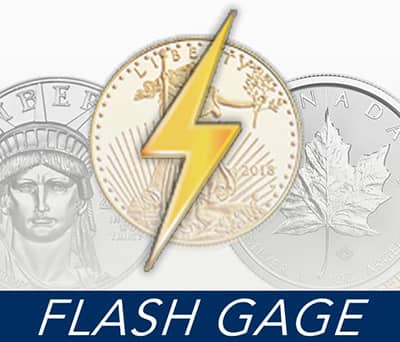
President Donald Trump told CNBC on Thursday the dollar will strengthen over time under his leadership and that recent remarks made by Treasury Secretary Steven Mnunchin about the greenback were misinterpreted. “The dollar is going to get stronger and stronger, and ultimately I want to see a strong dollar,” Trump said in an exclusive interview from the World Economic Forum in Davos, Switzerland. “Our country is becoming so economically strong again and strong in other ways, too.” Just on Wednesday, Mnuchin said he welcomed a weaker U.S. dollar, adding that it would benefit the country on trade.”
But President Trump’s comments to CNBC caught the Foreign Currency traders and the world Gold traders totally off guard.
What changed? I’m totally lost for an explanation.
This was going to be my comment tomorrow…
The U.S. Dollar
What is in the best interest of the American consumer and America’s business?
During President’s Trump’s campaign and in his first year in office has alluded many times that, the U.S. Dollar is too strong, and is killing us. He has said many times that our companies can’t compete because our currency is too strong.
If you have been watching the activity in the dollar index, we were trading at a high of 103.82 just a year ago in January 2017 and now we are under 89.
Let’s compare the benefits of a weaker dollar versus a stronger U.S. Dollar.
A weaker U.S. Dollar pumps up the volume of American exports. It makes goods and services produced in America less expensive relative to those products produced in other countries. Manufacturing in America grows creating more jobs for U.S workers.
A strong dollar has a number of positive impacts on the economy, the most obvious of which is that it makes imported goods more affordable for American consumers. It also makes investing in the U.S. more attractive to foreign companies and investment funds. The strong dollar also keeps the Treasury Department’s borrowing costs low, meaning that when the US borrows more money or rolls over existing debt, less federal spending is dedicated to interest payments than would be under a weak dollar scenario. Those lower interest rates extend to consumers as well, who benefit from cheaper mortgages and other loans.
It seems obvious which course of action this administration is taking.
The President is in Davos speaking to business leaders around the globe. Do you think the President will
follow through on his threat to impose protectionist trade restrictions meant to boost U.S. exports at the cost of foreign manufacturers? However, that might be a dangerous move, not only because it invites
instability in the markets, but also because it could spark retaliatory action from trading partners that could easily spiral out of anyone’s control.
America first. But at what cost?
Sure I can have a debate on both scenarios, but I think it’s best to leave it up to each individual
to decide which course of action is more beneficial to you, the average American.
Have a wonderful Friday.
Disclaimer: This editorial has been prepared by Walter Pehowich of Dillon Gage Metals for information and thought-provoking purposes only and does not purport to predict or forecast actual results. This editorial opinion is not to be construed as investment advice or as a recommendation regarding any particular security, commodity or course of action. Opinions expressed herein cannot be attributable to Dillon Gage. Reasonable people may disagree about the events discussed or opinions expressed herein. In the event any of the assumptions used herein do not come to fruition, results are likely to vary substantially. It is not a solicitation or advice to make any exchange in commodities, securities or other financial instruments. No part of this editorial may be reproduced in any manner, in whole or in part, without the prior written permission of Dillon Gage Metals. Dillon Gage Metals shall not have any liability for any damages of any kind whatsoever relating to this editorial. You should consult your advisers with respect to these areas. By posting this editorial, you acknowledge, understand and accept this disclaimer.
